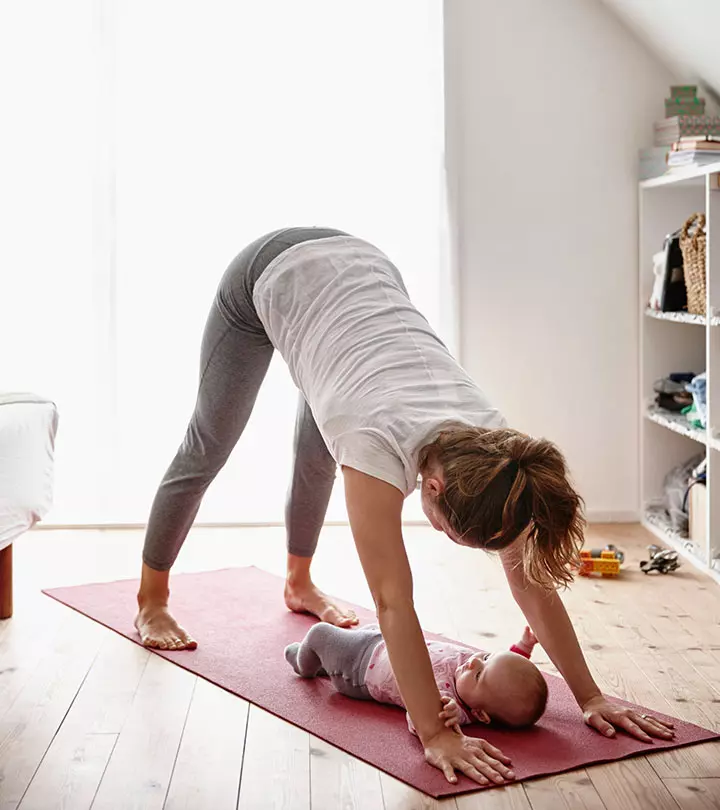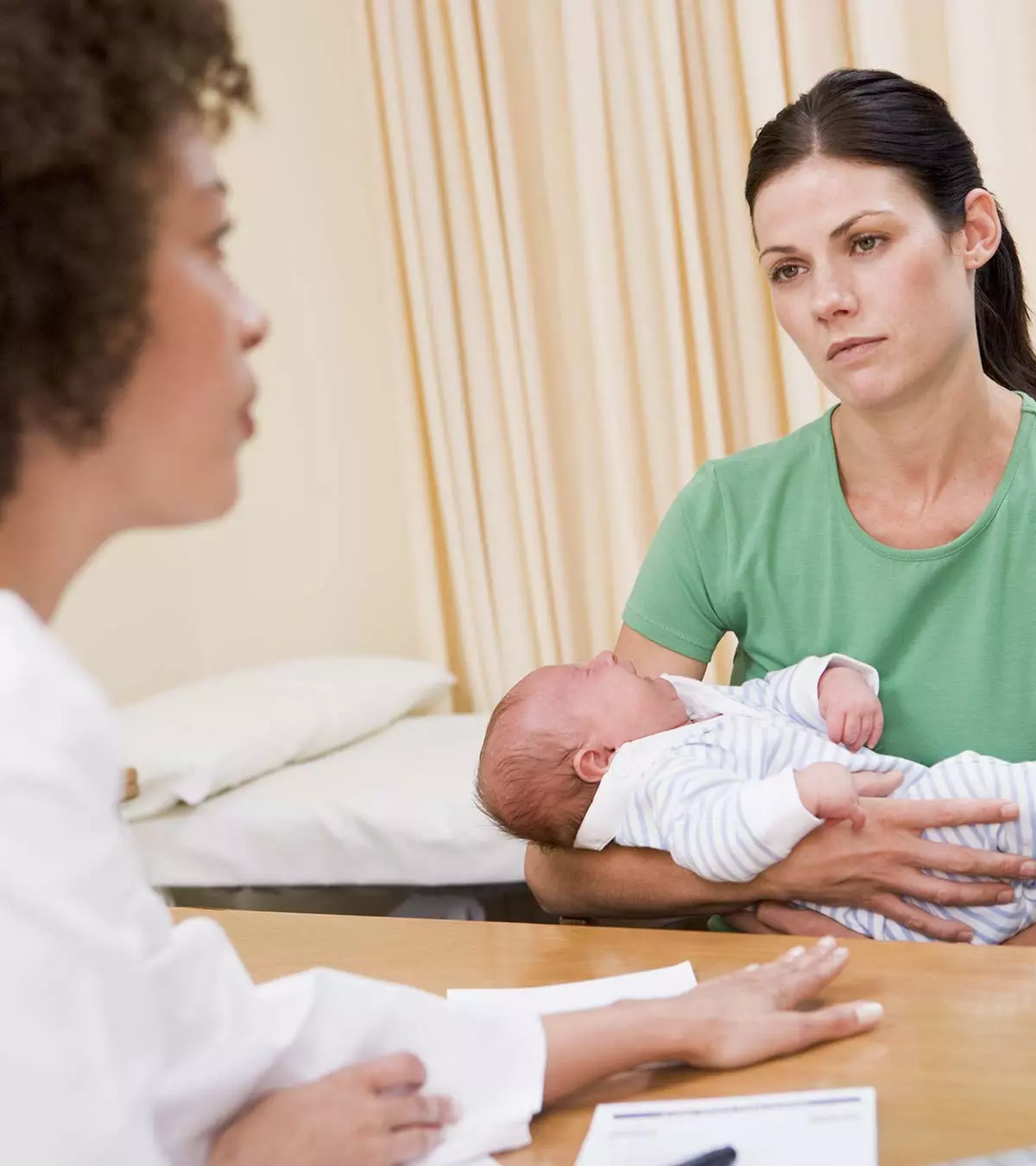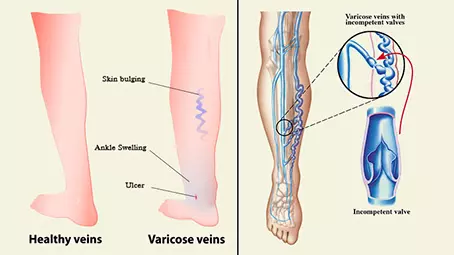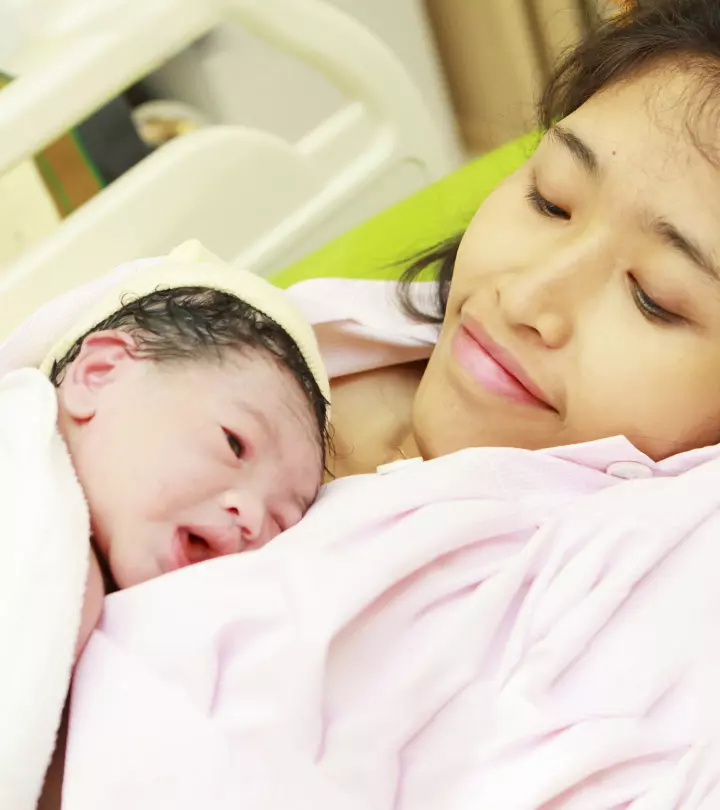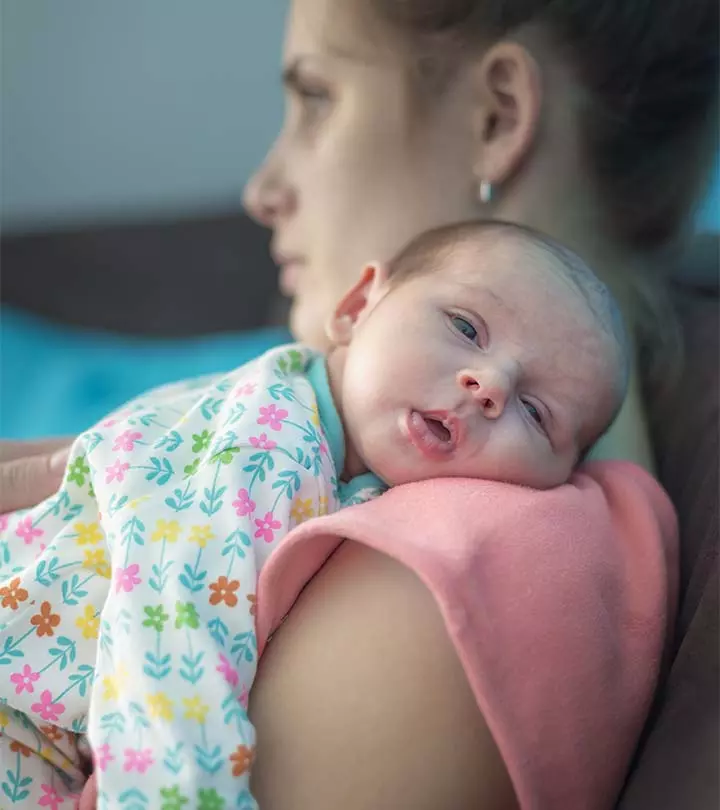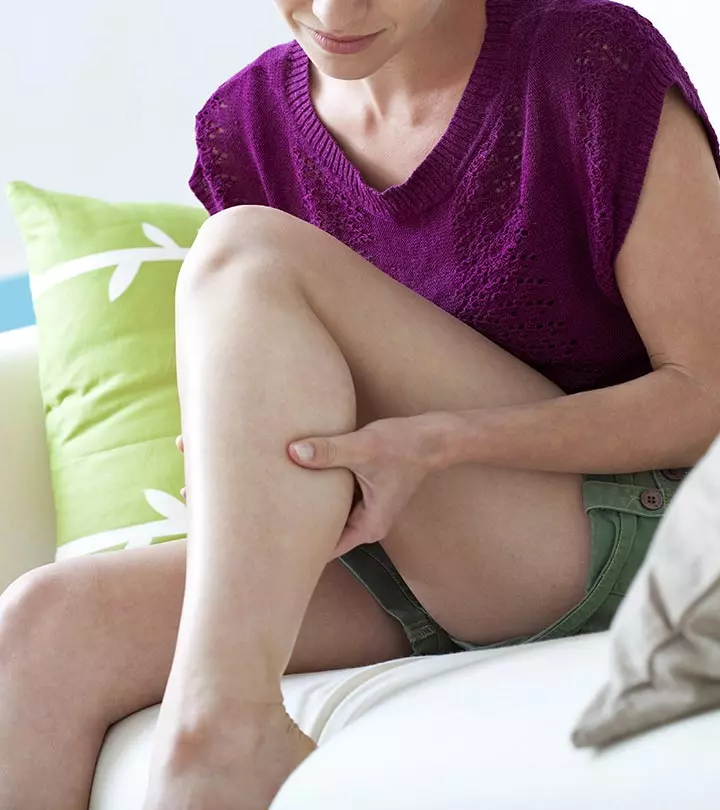
Image: ShutterStock
Postpartum edema (swelling) is a common condition characterized by swelling around the face, belly, and ankles. But what are the causes of edema? Some women may also experience swollen hands, legs, and feet (1). It may persist until a week or beyond after delivery. One may also notice swelling around the incision if they underwent a cesarean section (C–section) or episiotomy (2). The swelling may be accompanied by pain or tenderness and may cause discomfort and inconvenience. Read this post to learn more about the causes, symptoms, management, and prevention of postpartum edema.
Key Pointers
- Edema during pregnancy is caused by excess blood production, low protein concentration, and fluid accumulation, leading to post-pregnancy swelling.
- Hormones, expanding uterus, delivery process, and IV fluids are common causes of swelling after pregnancy.
- Remedies for postpartum edema include healthy diet, consuming fluids, elevating hands and feet, moderate exercise, massage, proper posture, soaking feet, herbal tea, and acupuncture.
- Post-pregnancy edema usually subsides on its own but can indicate serious complications such as Deep vein thrombosis, Postpartum cardiomyopathy, and preeclampsia.
- Reduce postpartum edema by having a balanced diet, natural diuretics, and quitting smoking; avoid processed foods and include sources of vitamin C and E.
Causes Of Postpartum Edema
You produce more blood during pregnancy to nourish and protect you and your baby. Also, a low concentration of proteins and dilution of blood might lead to low hemoglobin concentration and accumulation of fluids.
During the delivery, not all the extra blood may leave the body. A combination of this extra blood, postpartum hormones, and fluid retention may cause swelling post-pregnancy. It may sometimes lead to a condition called pitting edemaiAn edema characterized by an indentation that remains after pressure is removed from the swollen part (3).
Most women experience swelling during pregnancy, which may increase postpartum and cause afterbirth pains or general discomfort. Some common causes of swelling after pregnancy include:
1. Hormones
The body produces a large amount of progesterone during pregnancy. The excess progesteronei may cause water and sodium retention in the body, which could cause swelling after the baby’s birth (4).
 Research says
Research says2. Expanding uterus
When the uterus expands with the growing baby, the pressure is exerted over the veins towards the legs. It may restrict blood flow to the lower body. Since there is a build-up of fluid throughout pregnancy (5), it could take a certain time for the fluids to subside post-pregnancy.
3. The delivery process
The natural pressure created during pregnancy causes swelling. Along with it, pushing the body to give birth brings in more blood and fluids to the extremities. It might lead to swelling in the fingers, hands, legs, feet, and face.
4. IV fluids
Women who undergo a C-section usually receive medications and anesthesia through IV, and those who give birth vaginally receive medications, such as oxytocini, and certain fluids. These extra fluids may accumulate in the body and take several days to get flush out.
If the swelling does not subside on its own, you may follow some remedies that will help ease the swelling after pregnancy.
 Quick tip
Quick tipHow To Reduce Swelling After Pregnancy?
Here is a comprehensive list of remedies that might help in alleviating or eliminating postpartum edema.
1. Eat a balanced diet
When you eat properly, you are likely to flush out the extra fluids from the body and provide higher energy levels for your baby. Eat foods rich in protein such as fresh fruits, veggies, and complex carbohydrates. Also, include potassium-rich foods in your post-pregnancy diet to support ample nutrition and alleviate the swelling during postpartum recovery. Stay away from processed foods as they contain sodium that may cause bloating.
2. Consume more fluids
Drinking excess fluids will signal the body to flush out the fluids that it has been holding in. It may greatly help to relieve swelling. Ensure to maintain optimal hydration and empty your bladder often.
3. Keep your hands and feet elevated
Rest your hands and feet in an uplifted position for about 30 minutes every day. They should be raised above the level of your heart so that the blood flows into these areas properly. It might, therefore, reduce swelling in the extremities.
Lauren Thayer, a registered nurse from Olathe, Kansas, suggests, “When sitting, avoid crossing your legs to improve circulation. Also, try elevating your legs above your heart for 20 minutes periodically throughout the day to help with circulation and reduce swelling.”
4. Do moderate exercise

Perform moderate postnatal exercises and activities, such as walking and light stretching, as they may help improve circulation and remove excess fluids from the body through sweat. Caring for your newborn is also an exercise as it makes your heart pump efficiently. But do get your doctor’s approval before you begin anything.
5. Massage
Foot or leg massage is another way to ease the swelling and facilitate lymphatic drainage post-pregnancy if you do not experience pain. Postpartum massage is good for circulation and combating excess fluid build-up.
- Ask your partner to massage your legs and feet gently, starting from the bottom and working upwards.
- You might use base oils such as grape seed oil for massaging.
- But you should avoid aromatherapy essential oils.
- Watch this video to understand ways of massaging during and post pregnancy.
6. Maintain proper posture
Avoid crossing the legs and standing for a long duration. While lying down, place the feet at an elevation above the hips. Put your feet up high, above the level of your heart. It could improve circulation and ease the swelling.
7. Soak your feet
Soak your feet in a mixture of aromatherapy oil and water. To improve the blood flow and prevent varicose veinsiEnlarged and entangled veins commonly seen in the legs , you may use cypress oil. Lavender or chamomile oil may also mitigate discomfort.
8. Herbal tea
Try herbal remedies like herbal teas in moderation during and after pregnancy. Dandelion tea is a good choice as it might help in preventing fluid retention. Avoid them if you have gallbladder problems.
9. Cabbage leaves
Placing green or white cabbage leaves over the swollen area might relieve the swelling and discomfort. Anecdotal evidence suggests that this is effective in reducing the pain of breast engorgement (6). Hence, this remedy is often believed to work on swollen legs and ankles, too.
10. Acupuncture and foot reflexology

Contemporary therapies like acupunctureiA Chinese treatment method involving needle insertion in specific areas of the body to cure different ailments and foot reflexologyiA foot massage technique where pressure is applied on particular areas of the feet may help in easing swelling and discomfort. Acupuncture, a key component of traditional Chinese medicine, may help by re-balancing the internal energies as well as improving kidney function and circulation.
11. Stay cool
Stay at cool places as possible because the heat could worsen the swelling. As you are a new mom, stay indoors, and ensure you have good airflow in the room.
12. Some other tips
- Do not wear tight-fitting clothes or any accessories as they might prevent the blood flow, causing swelling.
- You may take a relaxing bath if your doctor has given you approval. It could also help relieve swelling.
- Lie down towards your side as it improves blood circulation and may reduce swelling.
- You may wear supportive socks or compression stockings after seeking the advice of a doctor.
Symptoms Of Postpartum Edema
Swelling in the hands and legs could be mild, moderate, or extreme.
- The skin on hands, legs, and other parts appear inflamed, stretched, shiny, and puffy.
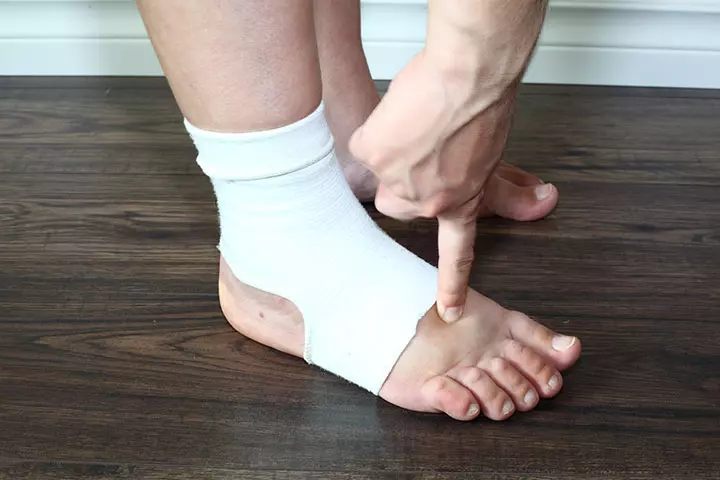
- Skin sinks if you press it.
- Swelling may also affect the abdomen apart from the hands and legs.
 Be watchful
Be watchfulDoes Swelling Subside On Its Own?
The first thing to remember is that you need to relax, as swelling during pregnancy is mostly normal.
- Swelling in familiar areas such as hands, legs, feet, face, and lower back should reduce in a week’s time.
- During this time, your kidneys would be subjected to overwork to eliminate the excess fluids from your body, and you are likely to urinate more.
- The extra fluids could also be expiated as sweat through your pores.
Sharing her insights on postpartum edema at Methodist Health System, obstetrician-gynecologist Dr. Emily Lange states, “I always warn women that it can take up to two weeks after delivery, or even longer, for the swelling to fully go away. The fluid shifts that occur during pregnancy, where you take on extra fluid, can remain for up to six weeks postpartum. In the first two weeks after delivery, you may still have a noticeable amount of fluid in your feet and hands, and it just takes time for it to resolve (i).”
Dealing With Incision Swelling After Giving Birth
Sometimes, there might be a painful swelling at the incision areas. Swelling in legs and feet is common in the initial days after C-section, making it difficult for you to care for your little one. There may also be additional bruising and swelling at the perineumiThe area between the genital region and the anal region if you experience a vaginal tearing or episiotomy.
Ice compresses could be of help for edema in legs and relieve swelling at the C-section and perineum incisions. You should wipe both the areas as directed by your healthcare provider. You may also take a warm shower to get some relief. Do not apply any lotion or creams containing vitamin E until the area heals completely.
When to Worry About Swelling After Pregnancy?
Edema after pregnancy is not a sign of serious illness and usually subsides on its own. However, in some cases, the swelling does not curb in a week’s time.
In some cases, the edema may be associated with other symptoms such as pain, breathing trouble, palpitationsiA sensation of the heart beating faster, fluttering, or skipping a beat , generalized swelling in the body, low urine output, etc. Consult your physician as a swollen body could sometimes indicate serious complications. The American College of Obstetricians and Gynecologists (ACOG) advises getting medical help immediately if swelling comes suddenly or includes pain, redness, or shortness of breath. These could be signs of serious issues like postpartum preeclampsia or blood clots (7).
A few of the risk factors of edema that you should be aware of include:
1. Deep vein thrombosis (DVT)
DVT might cause death within hours. It’s an emergency requiring administering anticoagulant (anti-clotting) medications and immediate hospitalization. If you notice the following symptoms, consult your doctor (8).
- Swollen ankles or legs
- Pain or tenderness in one or both the legs
- Red skin in the affected leg
- Visible veins
- Leg fatigue
2. Postpartum cardiomyopathy (PPCM)
A rare, life-threatening heart disease, PPCM comes suddenly and could be fatal. It may even happen in women who were previously healthy. One of the major symptoms of PPCM is postpartum edema. Other symptoms include (9):
- Palpitations
- Chest pain
- Fatigue
- Shortness of breath
- Increased urination at night
3. Postpartum preeclampsia
Preeclampsia (elevated blood pressure associated with a leak of proteins in the urine) is not rare during pregnancy. It may be complicated by eclampsia, which is the occurrence of generalized seizures. But it could happen after childbirth too. Postpartum eclampsia might strike as soon as you give birth or four to six days post-delivery. Symptoms of postpartum eclampsia include (10):
- Swelling in the extremities
- High blood pressure
- Excess protein in the urine
- Severe headaches
- Changes in vision
- Upper abdominal pain
- Nausea
- Decreased urination
- Seizures onset
Do not take any vitamin supplements until your doctors prescribe because they may increase your chances of getting preeclampsia after delivery. If you have the above symptoms, do check your blood pressure too.
Sarah, a mother of five, started feeling a series of discomforts and health issues after giving birth to her fifth baby via C-section. She explains, “My blood pressure kept elevating, my feet were swelling, and I was also battling a headache for days. That’s when I decided to call my family doctor. When I spoke with her, all that I told her was falling into the category of pre-eclampsia. My doctor ended up putting me on some blood pressure medication to treat my blood pressure, and as soon as I went on it, within hours, my headache went away, and I haven’t endured any swelling since (ii).”
How To Prevent Postpartum Edema?
Though it is not possible to prevent postpartum edema, you may reduce its severity. It means your feet and legs may become less tender and painful. One possible way to reduce swelling is to have a healthy balanced diet during pregnancy so that you do not gain excess weight.
- Include lean protein in every meal. Some of the good sources include meat, poultry, legumes, beans, and eggs.
- Consume about five portions of healthy food that includes fruits and veggies.
- Reduce the intake of sugar, salt, and fat foods and take in more water. It might help the kidneys to flush out excess liquids from the body.
- You might include natural diuretics as they help you to flush out excess fluids, thereby helping you to reduce the swelling. Natural diuretics include apples, citrus fruits, watercress, celery, and parsley.
- Include onion and garlic in your diet as they may help improve circulation.
- Avoid processed and pre-packaged foods as they might increase fluid content in the system because of their excess salt and additives.
- Eat foods that contain vitamin C and E. For vitamin C, take cabbage, broccoli, tomatoes, strawberries, melons, potatoes, bell peppers (red and green), and citrus fruits. For vitamin E, take almonds, cashews, corn oil margarine, wheat germ, sweet corn, vegetable oils (corn, wheat germ, and soy), and sunflower seeds.
- Quit smoking as it is not safe for your little one’s health and could prevent your postpartum swelling from healing (11).
Postpartum edema should not be a cause of great worry or confusion. Getting back to your former figure after childbirth could be a mammoth task, but as Sylvia Brown, co-author of The Post-Pregnancy Handbook, says, “A well-informed woman can use this time to heal her body properly and give it the rest and care that it needs.”
Expert Tips From A Gynecologist
- In the majority of the cases, this is not a matter of concern and subsides on its own within a week. Just have correct posture, exercise, protein-rich diet, and plenty of water.
- Observe the extent of edema. If it does not subside within a week or increases in severity or is associated with other problems, do not hesitate to talk to your doctor. They will check your blood pressure, find out if you have anemia or any other serious issue such as diseases of heart, kidney, liver, etc.
- Do not take any drug without consulting the doctor as they can cause further problems and may harm your baby if it is breastfed. Contact the doctor immediately if you feel pain in the legs or chest, have discomfort in breathing or palpitations.
Dr Sujoy Dasgupta
MBBS (Gold Medalist, Hons)
MS (OBGY- Gold Medalist)
DNB (New Delhi)
Fellow- Reproductive Endocrinology and Infertility (ACOG, USA)
Consultant Obstetrician and Gynecologist,
Specialist in Infertility and Sexual Dysfunction
Frequently Asked Questions
1. Will my feet get back to their pre-pregnancy size?
You may sometimes feel that your feet are large even after the swelling subsides. It may be because of the loosening of the ligaments, which may make your feet spread. This resolves on its own. Do not worry unnecessarily because this is a typical condition that may remain for a month after pregnancy.
2. Why is my one foot swollen postpartum?
If you notice swelling on only one of the feet or ankles, it is advised that you consult with the doctor immediately, as this might be a sign of a blood clot (12).
3. What are some prescription medications that can help with postpartum edema?
Specific dietary and lifestyle modifications are usually effective in treating postpartum edema, and prescription medications are not usually necessary. However, if the swelling fails to subside or worsens, consult a doctor, who will prescribe appropriate medications.
4. What kind of tests or exams are performed to diagnose postpartum edema?
There is no specific test or diagnosis for postpartum edema since this condition is typically not severe and usually resolves within a week. However, if the swelling persists and is accompanied by other symptoms, such as intense pain or difficulty in breathing, consult a doctor, who might recommend some tests if necessary.
5. Are compression socks good for postpartum edema?
Thayer opines, “Compression socks are tight stockings that improve circulation, preventing fluid pooling in your legs and enhancing blood flow throughout the body. In short, compression socks are good for postpartum edema and are the most frequently recommended treatment.”
Postpartum edema or swelling is a common condition and seldom a concerning issue. While some women accept it and let it subside on its own, others may want to learn how to cure postpartum edema. Either way, it is okay, and the key is to stay calm and healthy. You may try some preventive measures such as eating healthy to include the necessary nutrients and avoiding unsafe food options after consulting your ob/gyn. However, do not ignore it if the condition persists longer, as it may indicate an underlying issue requiring medical treatment.
Infographic: Effective Ways To Cure Postpartum Edema
Swelling is not just limited to pregnancy as it continues through the postpartum period for some women. If you have been wondering how to deal with postpartum swelling, our infographic can help you learn some valuable suggestions to reduce swelling and ease discomfort. Illustration: Momjunction Design Team

Feet swelling after delivery is common, but can be uncomfortable. Learn why it happens and how to reduce swelling and get relief.
Personal Experience: Sources
MomJunction articles include first-hand experiences to provide you with better insights through real-life narratives. Here are the sources of personal accounts referenced in this article.
i. Health Topics: Postpartum Swelling.
https://www.youtube.com/watch?v=sRX-j3bJVvE
ii. Diagnosed with postpartum preeclampsia; My experience.
https://www.youtube.com/watch?feature=shared&v=x694nC6UboQ
References
Community Experiences
Join the conversation and become a part of our nurturing community! Share your stories, experiences, and insights to connect with fellow parents.
Read full bio of Dr. Ben Abbes Taarji Hicham
- Lauren Thayer is a registered nurse with over nine years of experience in various fields including pediatrics, rehabilitation, and informatics. She graduated from Graceland University and works at Children's Mercy Hospital, Kansas.
 Lauren Thayer is a registered nurse with over nine years of experience in various fields including pediatrics, rehabilitation, and informatics. She graduated from Graceland University and works at Children's Mercy Hospital, Kansas.
Lauren Thayer is a registered nurse with over nine years of experience in various fields including pediatrics, rehabilitation, and informatics. She graduated from Graceland University and works at Children's Mercy Hospital, Kansas.
Read full bio of Rebecca Malachi
Read full bio of Swati Patwal
Read full bio of Aneesha Amonz












